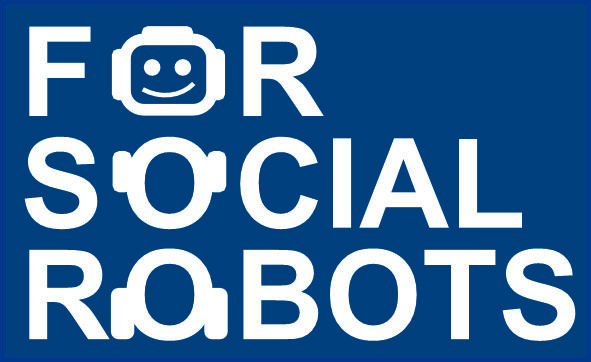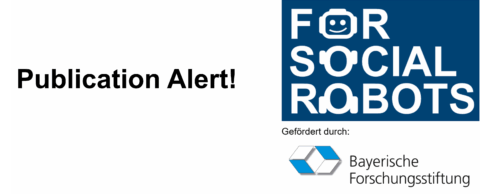30.04.2025 Übersicht über Veröffentlichungen aus dem 1. Projektjahr
Wir sind davon überzeugt, dass der Austausch von Forschungsergebnissen und Innovationen von zentraler Bedeutung ist. Wissenschaftliche Veröffentlichungen dienen nicht nur der Dokumentation unserer Fortschritte, sondern sie ermöglichen auch den Dialog mit der globalen Forschungsgemeinschaft und der gesellschaftlichen Öffentlichkeit. Durch das Teilen unserer Erkenntnisse tragen wir zur Weiterentwicklung unseres Fachgebiets bei und fördern die kollaborative Erforschung innovativer Lösungen im Umgang von Mensch und Roboter. Nachfolgend finden Sie eine umfassende Liste unserer Beiträge für das Jahr 2024.
- Engelhardt, M., Holzer, N., Pahl, J., and Freiherr, J. 2025. Electronic Library for Commercially Usable Emotional Stimuli (EL-CUES): An Annotated Image Database for Emotion Induction validated in a German population. IEEE Trans. Affective Comput., 1–12.
- Merz, N., Franke, J., and Reitelshöfer, S. Potentials and Challenges of Enabling Industrial and Professional Service Robots to be Social. In Annals of Scientific Society for Assembly, Handling and Industrial Robotics 2024.
- Merz, N., Wittenberg, T., Klein, S., Lu, S., Zebisch, R., Retzer, L., Niessen, C., Kraus, M., André, E., Lang-Richter, N., Pest, C., Berger, J., Schilp, J., Frank, J., and Reitelshöfer, S. 2024 – 2024. Towards Useful Social Capabilities for Robots in Healthcare. In 2024 2nd International Conference on Integrated Systems in Medical Technologies (ISMT). IEEE, 1–6. DOI=10.1109/ISMT62540.2024.10986204.
- Hörner, M., Goossens, C., Krückel, A., Pöschke, P., Singer, J., Schnepp, S., Seitz, K., Heindl, F., Amann, N., Hack, C., Wittenberg, T., Seuss, D., Beckmann, M., Huebner, H. and Fasching, P. Construction of a multimedia station featuring video-, infrared video- and audio recording of patient-physician communication. Senologie 2024; 21(02): 13 – 13. https://eref.thieme.de/ejournals/1611-647X_2024_02#/10.1055-s-0044-1786093
- Klein, S., Huch, J., Reißner, N., Zwolsky, P., Weitz, K., Kraus, M., & André, E. (2024, March). Creating a framework for a user-friendly cobot failure management in human-robot collaboration. In: Companion of the 2024 ACM/IEEE International Conference on Human-Robot Interaction (pp. 618-622).
- Kraus, M., Klein, S., Wagner, N., Minker, W., & André, E. (2024, July). A Pilot Study on Multi-Party Conversation Strategies for Group Recommendations. In Proceedings of the 6th ACM Conference on Conversational User Interfaces (pp. 1-7).
- Luna Jiménez, C., Jostschulte, J., Minker, W., Griol, D., & Callejas, Z. (2024). Applying Transfer-Learning on Embeddings of Language Models for Negative Thoughts Classification. In: IberSPEECH 2024 (pp. 46-50).
- Wittenberg, T., Ernst, A., Hauenstein, T., Merz, N., Sassen, S., André, E., Lu, S., Pest, C., Hutschenreiter, S., Berger, J., Franke, J., Reitelshöfer, S., Garbas, J., Münzenmayer, C., Oppelt, M., and Lang-Richter, N. 2024 – 2024. A Concept of Emotion-Driven Human-Robot-Inter-Action for Nursing Care Scenarios. In 2024 2nd International Conference on Integrated Systems in Medical Technologies (ISMT). IEEE, 1–6. DOI=10.1109/ISMT62540.2024.10986197
- Wittenberg: Robot-based contactless assessment of emotions and vital-signs in nursing homes. In: Abstracts of the 58th Annual Meeting of the German Society of Biomedical Engineering, 18 – 20 September 2024, Stuttgart“ Biomedical Engineering / Biomedizinische Technik, vol. 69, no. s2, 2024, pp. 1-109. https://doi.org/10.1515/bmt-2024-1002.
- Zebisch, Raoul, and Johannes Schilp. 2024. “A template for digital human representation in digital twin simulations of social human-robot interaction.” In 2024 4th International Conference on Electrical, Computer, Communications and Mechatronics Engineering (ICECCME), 4-6 November 2024, Male, Maldives, 1–6. Piscataway, NJ: IEEE. https://doi.org/10.1109/iceccme62383.2024.10796060
- FORSocialRobots Digital Twin 3D: A simulation framework for social robots (GitHub: https://github.com/PI-UniA/FSRDigitalTwin3D)


